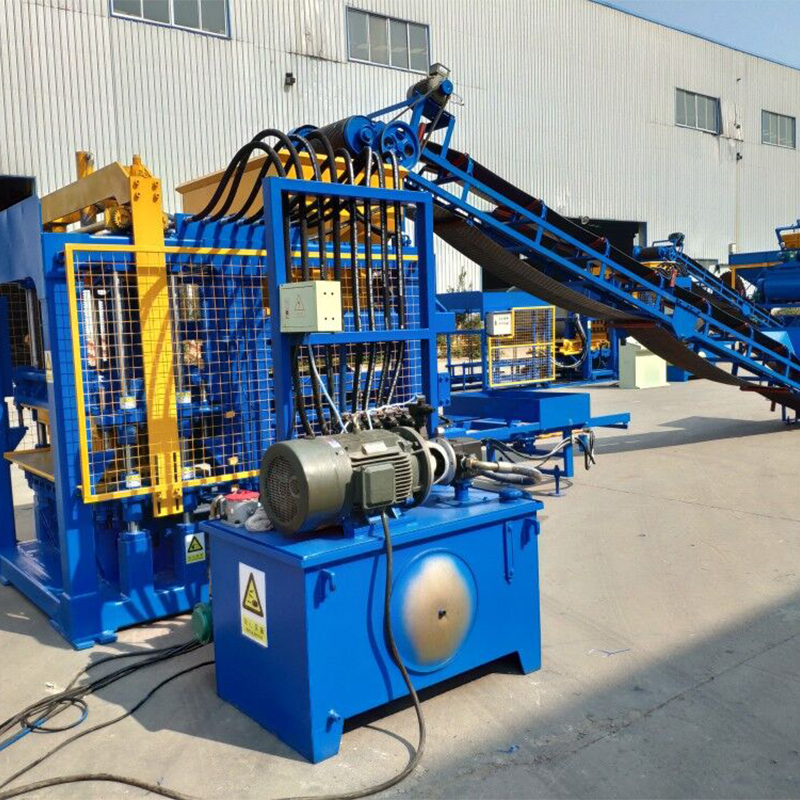
Image source Aiweibrickmachine
Industry 4.0 and Full-Automatic Block Manufacturing Supply Chains
Title: Industry 4.0 Integration: Revolutionizing Supply Chains in Full-Automatic Block Manufacturing
Introduction
The fourth industrial revolution, often referred to as Industry 4.0, has ushered in a new era of interconnected, smart, and data-driven manufacturing. In the context of full-automatic block manufacturing, the integration of Industry 4.0 technologies is reshaping supply chains, enhancing efficiency, transparency, and responsiveness. This article explores the transformative impact of Industry 4.0 on supply chains in the full-automatic block manufacturing sector.
1. **Real-Time Monitoring and Data Analytics**
Industry 4.0 introduces real-time monitoring and data analytics capabilities to the full-automatic block manufacturing supply chain. Sensors and IoT devices embedded in production equipment and logistics enable continuous monitoring of various parameters, such as machine performance, production rates, and inventory levels. The data collected is then analyzed in real-time, providing actionable insights that support informed decision-making and proactive problem resolution.
2. **Predictive Maintenance for Production Equipment**
Predictive maintenance is a key component of Industry 4.0 that enhances the reliability and efficiency of production equipment. Sensors on machinery used in full-automatic block manufacturing can monitor equipment conditions in real-time. By analyzing this data, predictive maintenance algorithms can forecast when equipment is likely to require maintenance or repairs, minimizing downtime and preventing unexpected failures. This proactive approach optimizes equipment performance and extends its lifespan.
3. **Supply Chain Visibility and Traceability**
Industry 4.0 technologies enable unprecedented visibility and traceability throughout the full-automatic block manufacturing supply chain. Each stage of the production process, from raw material sourcing to block delivery, can be tracked and monitored. Blockchain technology, in particular, ensures a transparent and immutable record of every transaction and movement within the supply chain. This level of visibility enhances accountability, reduces the risk of errors, and facilitates compliance with quality standards and regulations.
4. **Smart Inventory Management**
Smart inventory management is a significant benefit of Industry 4.0 for full-automatic block manufacturing. RFID (Radio-Frequency Identification) and IoT devices are employed to track inventory levels in real-time. Automated systems can then reorder raw materials or components when stock levels fall below predefined thresholds. This not only prevents stockouts and production delays but also optimizes working capital by minimizing excess inventory.
5. **Dynamic Demand Forecasting**
Industry 4.0 leverages advanced analytics and machine learning algorithms to enhance demand forecasting accuracy. By analyzing historical data, market trends, and external factors, the full-automatic block manufacturing supply chain can dynamically adjust production schedules and inventory levels in response to changing demand. This agility ensures that manufacturers can respond promptly to fluctuations in market demand, reducing the risk of overstock or stockouts.
6. **Collaborative Robotics (Cobots)**
Collaborative robots, or cobots, are a notable feature of Industry 4.0 that can be integrated into full-automatic block manufacturing supply chains. Cobots work alongside human workers, assisting with tasks such as material handling, quality control, and repetitive assembly. This collaboration enhances efficiency, reduces the risk of human error, and allows human workers to focus on more complex and value-added aspects of the manufacturing process.
7. **Supplier Collaboration Platforms**
Industry 4.0 facilitates the creation of supplier collaboration platforms that connect full-automatic block manufacturers with their suppliers in a digital ecosystem. These platforms enable seamless communication, information sharing, and collaboration between manufacturers and suppliers. Real-time updates on material availability, pricing, and order status streamline the procurement process, fostering stronger and more responsive supplier relationships.
8. **Customization and Mass Personalization**
The flexibility provided by Industry 4.0 technologies supports the trend towards customization and mass personalization in full-automatic block manufacturing. Advanced data analytics and production systems allow manufacturers to tailor products to meet specific customer requirements without sacrificing efficiency. This level of customization enhances customer satisfaction and opens new opportunities in niche markets.
Conclusion
The integration of Industry 4.0 technologies into the supply chains of full-automatic block manufacturing is driving a paradigm shift in the industry. Real-time monitoring, predictive maintenance, supply chain visibility, and collaborative robotics are just a few examples of how Industry 4.0 is enhancing efficiency, reducing costs, and enabling greater agility in the face of market dynamics. As full-automatic block manufacturers embrace these innovations, they position themselves at the forefront of a digital revolution that is reshaping the future of manufacturing supply chains.
